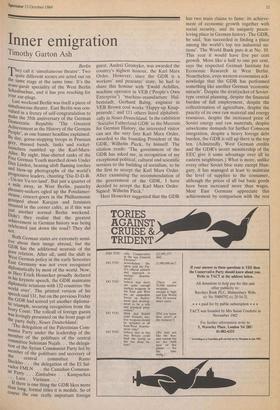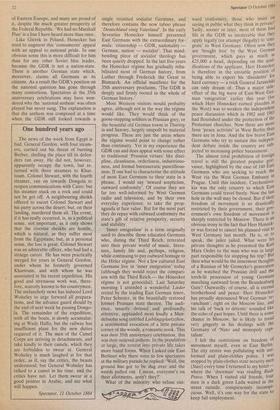Inner emigration
Timothy Garton Ash
They call it 'simultaneous theatre'. Two quite different scenes are acted out on the same stage at the same time. It's the avant-garde speciality of the West Berlin Schaubuehne, and it has you reaching for Your ear-plugs. Last weekend Berlin was itself a piece of simultaneous theatre. East Berlin was con- vulsed in a frenzy of self-congratulation to make the 35th anniversary of the German Democratic Republic The Greatest Achievement in the History of the German People', as one banner headline explained. By day, goose-stepping troops in Prussian g, rey, massed bands, tanks and rocket- launchers rumbled up the Karl-Marx- Allee. By night, blue-shirted ranks of the Free German Youth marched down Under eu Linden, bearing aloft flaming torches and blow-up photographs of the world's progressive leaders, chanting 'Die-D-D-R- , Un-ser Va-ter-land'. But just a quarter of a mile away, in West Berlin, paunchy pleasure-seekers ogled up the Potsdamer- strasse, concert-goers in the Philharmonic gossiped about Karajan and feminists moaned in the corner cafés, as if this was JU.st another normal Berlin weekend. Didn't they realise that the greatest achievement in German history was being celebrated just down the road? They did
riot.
Both German states are extremely sensi- tive about their image abroad, but the GDR has the additional neurosis of the Poor relation. After all, until the shift in West German policy in the early Seventies East Germany was not even recognised diplomatically by most of the world. Now, a. s Herr Erich Honecker proudly declared M his keynote speech, the GDR maintains diplomatic relations with 132 countries 'the World over'. The printed version of his sPeech said 131, but on the previous Friday the GDR had scored yet another diploma- tic triumph, securing recognition from the Iv orY Coast. The rollcall of foreign guests was lovingly presented on the front page of the party daily, Neues Deutschland: The delegation of the Palestinian Corn- Party under the leadership of the ntember of the politburo of the central c.oMmittee Suleiman Najab. . . the delega-
tion of the Syrian Communist Party led by member of the politburo and secretary of the central committee Ramo
Sheikho . . . the delegation of the El Sal- v. ador FMLN . . . the Canadian Commun- 1st Party . . . Zimbabwe . . . Kampuchea
• • • Laos. . Vietnam . • If there is one thing the GDR likes more than long, formal titles it is medals. So of course the one really important foreign
guest, Andrei Gromyko, was awarded the country's highest honour, the Karl Marx Order. However, since the GDR is a workers' and peasants' state, he had to share this honour with 'Ewald Achilles, machine operator in VEB (People's Own Enterprise') 'machine-manufacture Hal- bertstadt, Gerhard Babig, engineer in VEB Brown coal works 'Happy-up Knap- penrode,' and 111 others listed alphabeti- cally in Neues Deutschland. In the exhibition 'Socialist Fatherland GDR' in the Museum for German History, the interested visitor can see the very first Karl Marx Order, awarded to the founding President of the GDR, Wilhelm Pieck, by himself. The citation reads: 'The government of the GDR has asked me, in recognition of my exceptional political,- cultural and scientific services to the building of socialism, to be the first to accept the Karl Marx Order. After examining the recommendation of the government of the GDR, I have decided to accept the Karl Marx Order. Signed: Wilhelm Pieck.'
Herr Honecker suggested that the GDR has two main claims to fame: its achieve- ment of economic growth together with social security, and its uniquely peace- loving place in German history. The GDR, he said, 'has succeeded in finding a place among the world's top ten industrial na- tions'. The World Bank puts it at No. 10. This year it would have five per cent growth. More like a half to one per cent, says the respected German Institute for Economic Research in West Berlin. Nonetheless, even western economists ack- nowledge that the GDR has performed something like another German 'economic miracle'. Despite the straitjacket of Soviet- type central planning, despite the financial burden of full employment, despite the collectivisation of agriculture, despite the paucity of its own raw material and energy resources, despite the increased price of Soviet energy and raw materials, despite unwelcome demands for further Comecon integration, despite a heavy foreign debt burden, the GDR is still up there in the top ten. (Admittedly, West German credits and the GDR's secret membership of the EEC give it some advantage over all its eastern neighbours.) What is more, unlike every other Soviet bloc state except Hun- gary, it has managed at least to maintain the level of supplies to the consumer, although the prices of all but basic goods have been increased more than wages. Most East Germans appreciate this achievement by comparison with the rest of Eastern Europe, and many are proud of it, despite the much greater prosperity of the Federal Republic. 'We had no Marshall Plan' is a line I have heard more than once.
Like Gierek in Poland, Honecker has tried to augment this 'consumerist' appeal with an appeal to national pride. In one obvious sense this is more difficult for him than for any other Soviet bloc leader, because the GDR is not a nation-state. There is another German state which, rfioreover, claims all Germans as its citizens. As a result the GDR's position on the national question has gone through many contortions. Spectators at the 35th anniversary celebrations may have won- dered why the 'national anthem' was often played but never sung. The explanation is that the anthem was composed at a time when the GDR still looked towards a
single reunited socialist Germany, and therefore contains the now taboo phrase 'Deutschland einig Vaterland'. In the early Seventies Honecker himself presented East Germans with the extraordinary for- mula: 'citizenship — GDR, nationality — German, nation — socialist'. That mind- bending piece of socialist theology has been quietly dropped. In the last five years the Honecker regime has gradually reha- bilitated most of German history, from Luther through Frederick the Great to Bismarck. An official manifesto for the 35th anniversary proclaims, 'The GDR is deeply and firmly rooted in the whole of German history.'
Most Western visitors would probably agree, although not in the way the regime would like. They would think of the goose-stepping soldiers in Prussian grey, or the beautiful old German towns in Thuring- ia and Saxony, largely unspoilt by material progress. These are just the areas where the regime would point to change rather than continuity. Yet in my experience the GDR can and does appeal with some effect to traditional 'Prussian virtues' like disci- pline, cleanliness, orderliness, industrious- ness, and formal bureaucratic punctilious- ness. If one had to characterise the attitude of most East Germans to their state in a phrase, I would say 'inward scepticism, outward conformity'. Of course they are far too well-informed by West German radio and television, and by their own everyday experience, to take the prop- aganda at face value. But for the most part they do repay with outward conformity the state's gift of relative prosperity, security and stability.
'Inner emigration' is a term originally used to describe those educated Germans who, during the Third Reich, retreated into their private world of music, litera- ture, family life and, perhaps, religion, while continuing to pay outward homage to the Hitler regime. Not a few cultured East Germans live in 'inner emigration' today (although they would reject the compari- son with the Third Reich — the Honecker regime is not genocidal). Last Saturday morning I attended a wonderful Lieder recital by the leading East German tenor, Peter Schreier, in the beautifully restored former Prussian state theatre. The audi- ence, smartly dressed and profoundly attentive, applauded most loudly a Men- delssohn song entitled Lieblingsplaetzchen, a sentimental evocation of a little private corner of the woods, a romantic nook. This was their 35th anniversary celebration, this was their national anthem. In the population at large. the retreat into private life takes more banal forms. When I asked one East Berliner why there were so few spectators at the military parade he replied: 'Well, the ground has got to be dug over and the weeds pulled out. I mean, everyone's on their allotments, aren't they?'
What of the minority who refuse out-
ward conformity, those who insist on saying in public what they think in private? Sadly, sooner or later, most of them find life in the GDR so intolerable that they apply legally (or attempt illegally) to 'emi- grate' to West Germany. Often now they are 'bought free' by the West German government, which pays as much as £25,000 a head, depending on the qual- ifications of the applicant. Herr Honecker is therefore in the enviable position of being able to export his 'dissidents' for, hard currency — a trick General Jaruzelski can only dream of. Thus a major side effect of the big wave of East-West Ger- man 'emigration' earlier this year (fn.r which Herr Honecker earned plaudits in the West) was to weaken the independent peace discussion which in 1982 and 1983 had flourished under the protection of the Protestant churches. Now there are more Jena 'peace activists' in West Berlin than there are in Jena. And the few brave East Germans who try to sustain this indepen- dent debate inside the country are sub- jected to increasing police harassment.. The almost total prohibition of foreign travel is still the greatest popular grie- vance, highlighted by the case of 140 East Germans who are seeking to reach the West via the West German Embassy In Prague. Until this incident, Czechoslova- kia was the only country to which East Germans could travel freely. Now the last hole in the wall may be closed. But if their freedom of movement is so drastically restricted by their government, their goy.- ernment's own freedom of movement is sharply restricted by Moscow. There is an obvious irony in the fact that Herr Honeck- er was forced to cancel his planned visit to West Germany last month. He is, so to speak, the jailer jailed. What were his, private thoughts' as he presented the Karl Marx Order to the man who was in large part responsible for stopping his trip? But then what would be the innermost thoughts of a Russian of Mr Gromyko's generation as he watched the Prussian drill and the torch-lit procession of young Germans marching eastward from the Brandenburg Gate? Outwardly, of course, all is eternal brotherhood and peace. Herr Honecker has proudly denounced West German 're- vanchism', right on the Moscow line, and his talk of 'back to detente' sounded like the echo of past hopes. Until there is some chance in Moscow, he is likely to tread very gingerly in his dealings with the Germany of 'Nato and monopoly capi- talism'.
I felt the restrictions on freedom of movement myself, even in East Berlin. The city centre was pullulating with uni- formed and plain-clothes police. I was stopped by plain-clothes state security men (Stasi) every time I returned to my hotel --- where the 'doorman' was reading Rude Pravo. When I visited old friends, four men in a dark green Lada waited in the street outside, conspicuously inconspi- cuous. Well, it's one way for the state to keep full employment.























































 Previous page
Previous page